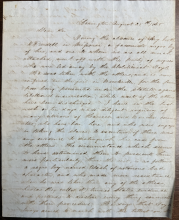Lexington August 25th 1848
Dear Sir,
During the absence of my brother R Pindell in Missouri, a favourite negro boy of his, and one to whom we are all much attached, went off with the party of negroes who were led away by the Abolitionist Doyle.
He was taken with the others, and is now confined in the jail in Brookville, for the purpose of being prosecuted under the statute against rebellion & insurrection, while most of the other have been discharged. I have in the last week or ten days made diligent inquiry of many citizens of Harrison and Bracken counties, who have been here, and who were engaged in taking the slaves, to ascertain if there was any evidence to distinguish his case from the others. The circumstance which seems to have determined them to prosecute him more particularly than the rest, is as follows a negro boy named Wash of notorious bad character, and who made more resistance when he was taken than any of the others, has (as they called it) turned States evidence and pretends to disclose very thing connected with their procedure. He says that Doyle always aimed to march with the tallest on the right and next to himself, and that in giving his directions he addressed himself and particularly o those near him, and they would “pass the word” to the others.
And that my brothers boy being very tall was denom by Wash denominated a leader There is no white evidence against him whatever. Since those negroes who have been dis-charged have been brought here I have made it my business to go to the jails, and talk confidentially with many of them, telling them that I desired to defend Harry, and that in order to do so, I must know the whole truth of the matter. They all declare that they did not know Harry as a leader, or officer, or manager, or any thing of the kind. One or two of them say Doyle did endeavor to make them march in in [sic] military order, with the tallest on the right, but found it impossible to do so, and after a few hours gave it up.
Mr Wm Frazer’s boy, (and Mr Frazer, says he has the highest confidence in his truthfulness)
And two others who are the only ones who remember to have noticed Harry on the march, say that he began to tire away soon after they started, and was generally lagging back,” and Frazer’s boy tells his master that he saw Harry in the first fight standing back, and taking no part in it whatever. I have seen none who saw him in the second fight, where Fowler was wounded, and though I have not seen him I understand he denies having been there.
It may be proper to add that no negro has ever sustained a higher character than Harry, and he has been especially marked for his respect and deference towards white men—poor, as well as rich. I believe he is the only servant my aunt (who is the worst manager of servants in the world) ever had who never gave her a word of impudence.
We have always had the utmost confidence in his honesty, and he proved it by starting off, without any thing but what belongs to him, though he had access to Hundreds of Dollars worth of Silver plate.
If the affair amounts to rebellion or insurrection at all, I cannot see how either of them who may be indicted can escape conviction
We would all therefore sir feel under great obligations to you, if you could find it consistent with duty to grant him a pardon before his trial and I sincerely believe this to be a proper case for the exercise of that power. I have only made this application after convincing myself, that there is nothing to distinguish Harrys case from any other, or which should especially subject him to punishment
I understand that when he belonged to Graves, the man from whom my brother purchased him, he was continually in the habit of traveling about alone, and once even went to the state of Indiana. I am therefore constrained to believe that he was led off by the persuasions of Doyle perhaps by such overwrought pictures of the blessing son liberty as few men in bondage could resist. It would seem hard therefore to have him hung, while Doyle escapes with a short confinement tin the penitentiary
I will undertake that if Harry is pardoned he shall be immediately sold down the river
Very Respectfully yours &c.
H.C. Pindell
[Endorsement by Gov. William Owsley]: Petition in heal of Pindels boy Harry Slaughter who is imprisoned in Jail under charge of Insurrection &c.
The case in my opinion is one not proper for execution in the [illegible] before trial- After trial the circumstances may be more fully understood, os as to enable the [illegible] to [crossed out] do what may seem proper in the case, in case more [illegible] of this boy
Wm Owsley
H.C. Pindell to Owsley, August 25, 1848, Lexington, KY, Petitions for Pardons, Remissions, & Respites, Governor William Owsley Papers, box 27, folder 573, Kentucky Department for Library and Archives, Frankfort, KY

